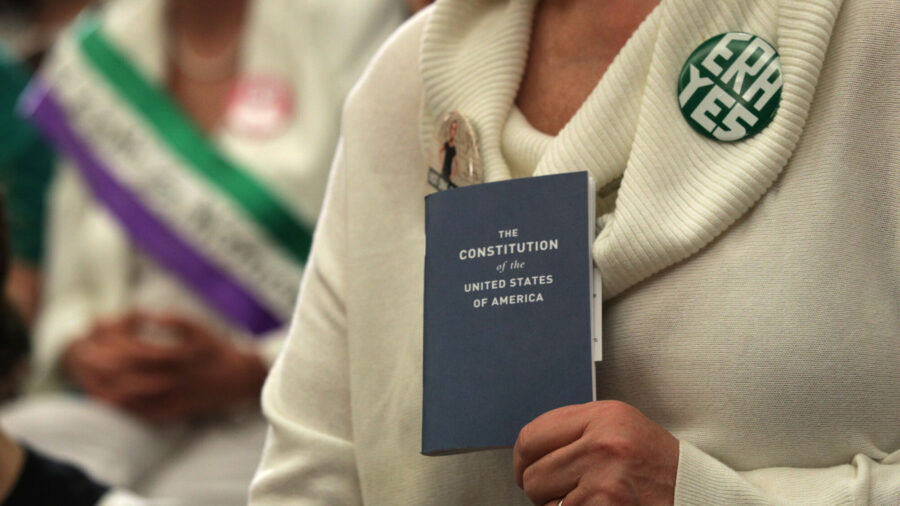The House on Wednesday adopted a resolution that would remove a deadline for states to ratify the Equal Rights Amendment (ERA), a move that Rep. Tom McClintock (R-Calif.) called “brazenly unconstitutional.”
The resolution to repeal the ERA’s ratification deadline passed 222-204, with four Republicans joining all Democrats in voting for the measure. The amendment would abridge the U.S. Constitution by adding language that bans discrimination on the basis of sex.
But besides substantive debate around the merits of the amendment, there is the question of a deadline for its ratification—one that both the Department of Justice (DOJ) and a federal court have said has long since passed.
McClintock said Wednesday that one of the biggest advocates of the amendment, the late Supreme Court Justice Ruth Bader Ginsburg, had said it was time to start the process from the beginning and renew the discussion on its merits.
“This measure is brazenly unconstitutional,” McClintock said. “If the majority were serious, they would reintroduce the ERA and debate it openly and constitutionally as Ginsburg suggests.”

Rep. Jerrold Nadler (D-N.Y.), who is chairman of the House Judiciary Committee, argued that Congress has the authority to extend or remove any deadlines it chose to set previously.
“We are on the brink of making history and no deadline should stand in the way,” Nadler said.
Supporters of ERA, including President Joe Biden, see it as an important provision to protect women’s rights under the Constitution.
In a statement Wednesday, Biden noted that he supported the ERA when he was a young senator, adding, “Nearly 50 years later, it is long past time that we enshrine the principle of gender equality in our Constitution.”

Opponents have raised various arguments against the measure, including that it is superfluous as the 14th Amendment already affords equal rights to all citizens, which implicitly includes women. Some have argued that the amendment could potentially even weaken protections for women by negating the enactment of laws that benefit only women. Others have argued that, since the amendment doesn’t specify women, its language could be used to upset traditional gender norms, and it could pave the way for more permissive laws on abortion.
Speaking on the House floor ahead of the vote, Rep. Vicky Hartzler (R-Mo.) called the measure “a path that has already proven to be a threat to women’s privacy, safety, and equality.”
“Don’t take it from me. Talk to the nine women in California who were sexually harassed in a women’s shelter by a biological male identifying as a woman,” Hartzler said. “The Equal Rights Amendment would not only codify inequality for women but also destroy the rights of the unborn. ERA advocates have been unequivocal about their support for abortion and using the ERA to overturn pro-life laws.”
The text of the ERA reads:
Section 1: Equality of rights under the law shall not be denied or abridged by the United States or by any state on account of sex.
Section 2: The Congress shall have the power to enforce, by appropriate legislation, the provisions of this article.
Section 3: This amendment shall take effect two years after the date of ratification.
The fight over the Equal Rights Amendment began almost a century ago. The amendment was first proposed in Congress in 1923 and was passed in 1972, where it then went to the states for ratification, according to the Alice Paul Institute. Congress gave the states a seven-year deadline, which was then extended until 1982, but only 35 states had ratified the amendment, falling short of the necessary 38 state ratifications, or three-quarters of the 50 states, as required by the Constitution.
In January 2020, the Justice Department (DOJ) issued a legal opinion arguing that the deadline to ratify the ERA had already expired despite recent efforts to revive the proposed amendment.

Just weeks ago, a federal district judge dealt a further blow to advocates of the ERA, ruling that the deadline to ratify it “expired long ago” and three states’ recent ratifications of the amendment arrived too late to count.
In 2020, Virginia, Illinois, and Nevada sued the archivist of the United States to compel the publication and certification of the ERA as the 28th Amendment to the Constitution. The three states recently ratified the ERA, with Virginia claiming to be the 38th state to ratify—and the final one required to meet the threshold for adding it to the Constitution.
One of the ERA’s opponents, National Right to Life, insists that the deadline to pass the amendment expired decades ago and that Congressional resolutions that seek to revive it are unconstitutional.
Douglas Johnson, the National Right to Life’s senior policy adviser, told CNN that the idea that ERA has been ratified or is close to ratification is “political theater.”
“The Constitution does not empower Congress to employ time travel to resuscitate a 42-year-dead amendment,” Johnson told the outlet, adding that the Congressional resolution is part of a “political-pressure campaign to intimidate the federal courts into permitting them to air-drop the long-expired ERA into the Constitution.”
Supporters of the amendment, such as Rep. Jackie Speier (D-Calif.), the sponsor of the resolution to repeal the ratification deadline, said there is no expiration date on equality.
“We demand that we be put into the Constitution,” Speier said.
Janita Kan and The Associated Press contributed to this report.
From The Epoch Times


